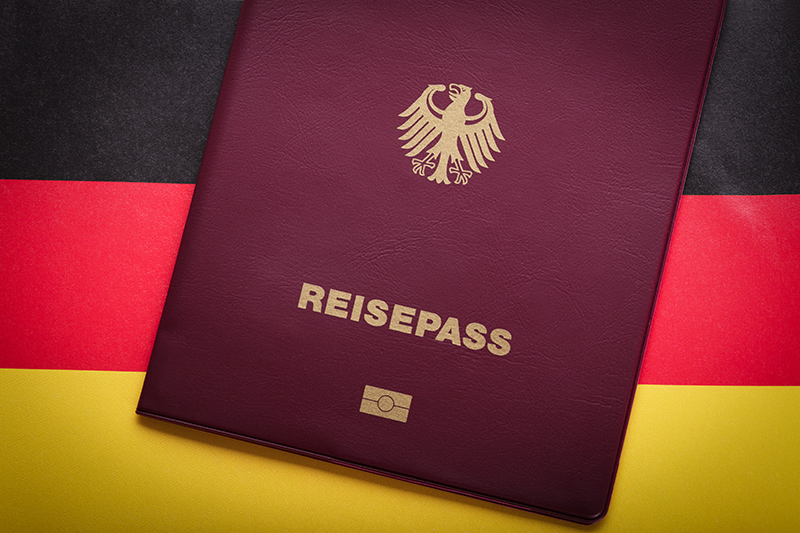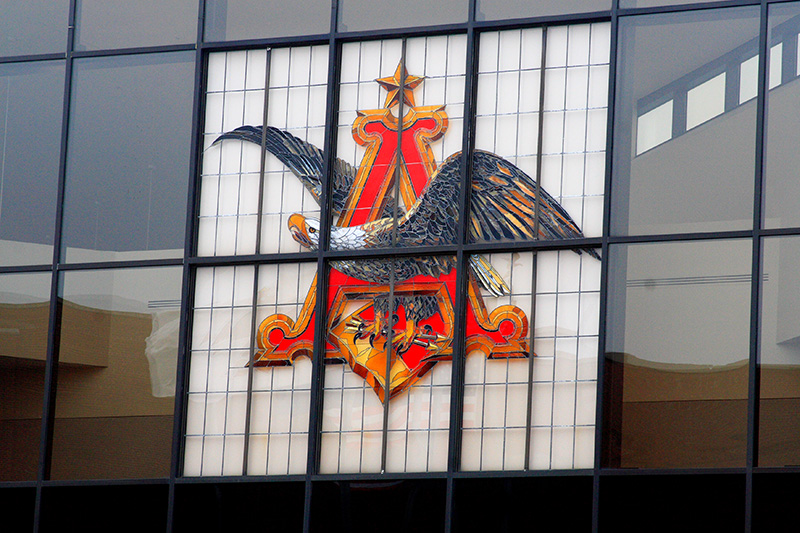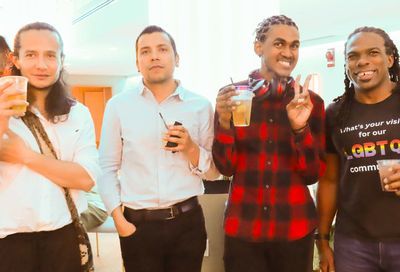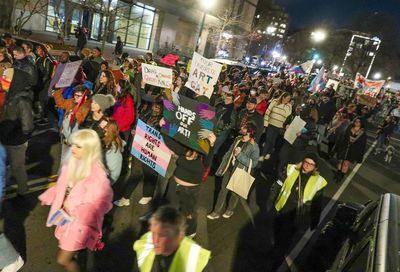‘Catholics for Trump’ touts an anti-LGBTQ political agenda. That’s not what most Catholics believe.
The Trump-supportive group is out of step with the LGBTQ-affirming beliefs of many Catholic Americans

“I think the reason that rank-and-file Catholics are supportive of LGBTQ issues is that Catholics embrace the values of family and justice,” says Marianne Duddy-Burke, executive director of DignityUSA, an LGBTQ Catholic organization.
“It’s hard to imagine a Catholic family anywhere in the United States that is not personally affected by the concerns of LGBTQI individuals,” she continues. “What family doesn’t have a lesbian, gay, transgender member in it? By and large, Catholics rally around our families. We understand that love is expansive, love is inclusive, and that everyone incarnates God in some way.”
That support has been borne out over the past decade in a number of polls showing that American Catholics are among the leading religious communities expressing support for LGBTQ issues. According to two recent surveys from the Public Religion Research Institute, Catholics express support for transgender rights, nondiscrimination protections for LGBTQ people, and even same-sex marriage at rates higher than the national average.
Yet despite poll after poll over the past decade showing that rank-and-file Catholics are much more progressive on social issues, the voices from within the Catholic community that are elevated on the national stage tend to be those more hostile to the LGBTQ community.
Such is the case with the recently launched “Catholics for Trump” group, a coalition of conservative Catholics who are supporting President Donald Trump’s re-election campaign. Announced earlier this month, the group touts the president’s stances on various social issues that they hope will galvanize more conservative Catholics to the polls in November. It also attempts to cast Joe Biden, a pro-choice Catholic, and more secular elements within the Democratic Party as extremists who are waging a war against religious people.
During its launch, which was live-streamed online due to the ongoing COVID-19 pandemic, members of the group doubled down on their opposition to abortion, their calls for the appointment of conservative judges to the federal judiciary, and support for policies that grant special religious exemptions to people who oppose contraception, same-sex marriage, or homosexuality.
Members of the group’s board include several figures with a history of hostility toward the LGBTQ community, including former House Speaker Newt Gingrich, who opposed marriage equality and has repeatedly spoken out against transgender rights; former Congressman Tim Huelskamp (R-Kansas), who called marriage equality a “legal fiction”; and Marjorie Dannenfelser, the president of the anti-abortion Susan B. Anthony List, who has worked with Vice President Mike Pence to push for anti-LGBTQ religious exemptions.

Others involved with the organization include Sean Fieler, the chair of the American Principles Project, who has claimed that same-sex relationships are unstable and said that being transgender “can never be normalized”; and Austin Ruse, the president of The Center for Family and Human Rights, who said that “sexual orientation and gender identity is code for odious sexual behavior and gender lunacy.”
Following the group’s launch, various LGBTQ groups criticized the coalition for being out-of-step with most American Catholics, particularly younger generations who are more accepting of LGBTQ rights.
“Trump has a position on LGBTQ issues that I think is out of line with the majority of Catholics in the pews,” says Francis DeBernardo, executive director of the pro-LGBTQ Catholic organization New Ways Ministry. “Survey after survey for the past 10 years shows that U.S. Catholics are overwhelmingly supportive of LGBTQ equality.”
DeBernardo notes that Trump sold himself as a pro-LGBTQ candidate when running for the presidency in 2016, but once he got to office, he began adopting positions and pushing various policies that negatively impacted LGBTQ people.
In addition, DeBernardo believes Catholics who voted for the president four years ago may be reluctant to back him again. This may be particularly true for Catholics who embrace a more compassionate approach to immigration as consistent with the Catholic Church’s stance on welcoming the stranger and its views on the dignity of every human being.
DeBernardo believes it is that same teaching on human dignity that has led most rank-and-file Catholics to be supportive of LGBTQ rights.
“Catholics in pews see LGBTQ issues as human rights issues, while the bishops and church hierarchy see those issues as being about sexuality,” says DeBernardo. “Catholic teaching is strong about the dignity of every human person, whether we agree or disagree with who they are or any facet of their personality. Catholics have absorbed that teaching and they see that discrimination against LGBTQ people as wrong. For example, there are some Catholics who may not back marriage equality, and may not believe it’s moral, but see it as necessary because people’s rights need to be respected.
“The other reason for the disparity between Catholics in pews and the hierarchy has been that, since the 1960s, Catholics have been questioning the Church’s views on sexual ethics,” he says, referring to its teachings on birth control — which statistics show are not followed by up to 96% of U.S. Catholics in their personal lives. “That, coupled with the clergy sex abuse crisis, has led to bishops losing a great deal of credibility when making any pronouncement about sexuality.”
Duddy-Burke believes the disparity between official Church doctrine and Catholics’ personal political attitudes, as revealed by polling, is due in part to the structure of the church hierarchy and the strict control that the U.S. Conference of Catholic Bishops — which serves as the official mouthpiece of the church in the United States — has over the messaging around Catholic doctrine.
As a result, the media is more likely to elevate and promote more conservative views on issues like LGBTQ rights than those of individual Catholics whose personal views don’t align with those espoused by the bishops. At the same time, there is a tradition within the Catholic faith of questioning one’s own religious beliefs in the hope of reaching a deeper understanding of faith.
“Catholics are also, by and large, a very educated group,” Duddy-Burke says, referring to the religious instruction that Catholics receive not only in church, but in Catholic primary and secondary schools and Catholic-affiliated institutions of higher learning. “Through our intellectual training, we are able to separate out what’s essential to our faith: sacramentality, service to the poor, all of those kinds of things, from teachings that the church proclaims that are not essential articles of faith.”
Daniel Barutta, president of Dignity’s Washington chapter, notes that for many Catholics, especially those who are LGBTQ, their faith is deeply rooted in their cultural identity.
“I’m Italian-Catholic,” he says. “A lot of people say ‘how can you be gay and Catholic at the same time. That’s an oxymoron.’ I say, there’s no way I can’t be Catholic and gay at the same time. I grew up Catholic. All our family feasts and celebrations are centered around the church liturgical year. It’s part of our culture. You can’t separate that. On the other hand, it’s hard to support an institution that calls you intrinsically immoral and dysfunctional.”
Barutta has seen attitudinal shifts on social issues, particularly among younger Catholics.
“In terms of LGBTQ issues, as more Catholics have realized there are people in their families who are gay, and as more young people are proud of who they are, I think support for the LGBTQ community is becoming more commonplace and accepted.”
Duddy-Burke says that the message espoused by “Catholics for Trump,” particularly as it relates to religious-based exemptions, is potentially harmful to the LGBTQ community and runs counter to the values of charity and love that are supposed to be central to Catholicism.
“Their attempt to impose a very narrow standard of understanding of morality and religious belief on a diverse country is really, really dangerous, and in opposition to the ideals of our faith,” she says. “It’s wrong for them to advocate withholding treatment from transgender individuals at 1 in 6 hospital beds across the United States, or terminating LGBTQ employees for getting married, or pushing to ban LGBTQI people — or people of faiths that are ‘not acceptable’ — from being adoptive or foster parents, which impinges on the safety and future of vulnerable children in our country. When you think about the impact that this fight for religious-based exemptions has on people’s lives, it’s very sobering and very frightening, and in some instances downright cruel.”
But most Catholics, says Duddy-Burke, do not embrace those hard-line views, suggesting that they will not necessarily fall in lockstep behind Trump’s re-election bid. In fact, she would bet against the president winning the Catholic vote this time around.
“A commitment to social justice is crucial to the Catholic faith. Our faith places an importance on removing the structural oppression that people at the margins of society face. Catholics really understand what it means that society is structured unequally, and are really concerned about that. And they bring that concern with them into the political arena.”
Support Metro Weekly’s Journalism
These are challenging times for news organizations. And yet it’s crucial we stay active and provide vital resources and information to both our local readers and the world. So won’t you please take a moment and consider supporting Metro Weekly with a membership? For as little as $5 a month, you can help ensure Metro Weekly magazine and MetroWeekly.com remain free, viable resources as we provide the best, most diverse, culturally-resonant LGBTQ coverage in both the D.C. region and around the world. Memberships come with exclusive perks and discounts, your own personal digital delivery of each week’s magazine (and an archive), access to our Member's Lounge when it launches this fall, and exclusive members-only items like Metro Weekly Membership Mugs and Tote Bags! Check out all our membership levels here and please join us today!
























You must be logged in to post a comment.